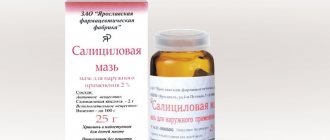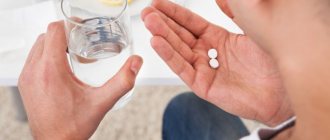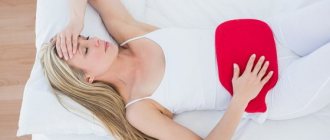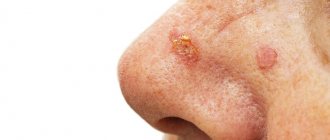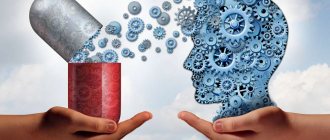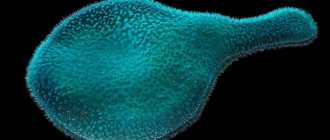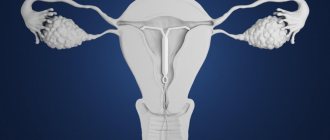Questions:
- What is an immunomodulator?
- Immunostimulants and immunomodulators: differences
- Classification
- Action and use of immunomodulators and immunostimulants
- For children
- For children under one year old
- During pregnancy
- Natural immunomodulators
- For a cold
- Harm and contraindications
- Is an immunogram necessary before and after treatment?
Medical specialists answer frequently asked questions from users
Immunostimulants and immunomodulators: differences
Immunostimulants and immunomodulators are two groups of drugs that stimulate the immune system. In a broad sense, these drugs are identical, since they perform the same function, but still, they have differences from each other. In order to once and for all understand and remember what the differences are between immunostimulants and immunomodulators, you need to know what each of these terms means.
Immunomodulators are (conditionally) “weakly neutral” drugs that simply act on the body and force its own immunity to work more thoroughly under certain conditions (for example, during ARVI).
Immunostimulants are more “powerful” and “strong” drugs that are used only in cases where the human immune system suffers significantly, and one’s own immunity cannot cope with even minor diseases. In other words, these drugs are used mainly only for immunodeficiency conditions (for example, HIV).
to the begining
Is it necessary to stimulate the immune system? Let's talk about immunostimulants
Currently, there are many immunostimulating drugs. And perhaps someone, deciding that their immune system is weakened, rushes to the pharmacy to purchase them. But is this right? Who is indicated for the use of immunostimulants, how do they work and how can they be harmful?
Ulyana Vladimirovna Chemova, a pediatrician, allergist-immunologist at the Expert Clinic Smolensk, answered our questions.
— Ulyana Vladimirovna, tell us what immunostimulants are and what they are needed for?
— Immunostimulants refer to biologically active substances (and these are not necessarily drugs) that are designed to enhance the function of the immune system, its various components, both nonspecific and specific (T-cell and B-cell).
— Are immunomodulators and immunostimulants the same thing or are there differences between them?
- These are different things. Immunomodulators are biologically active substances that, in therapeutic doses, restore the impaired function of the immune system. Consequently, their immunological effect depends on the initial state of human immunity: they reduce elevated and increase decreased immunity levels.
Immunostimulants are biologically active substances that primarily enhance immunity, bringing reduced levels to normal values.
There are also immunosuppressants - biologically active substances that suppress the immune response.
— Who is indicated for the use of immunostimulants?
— Generally speaking, then, of course, these are people with immunodeficiencies, primary or secondary. Primary immunodeficiencies are a category of hereditary diseases that are quite rare, but their symptoms and manifestations are usually well known to immunologists.
Immunostimulants are also prescribed for ARVI in cases where these infections lead to complications and end in severe bronchitis, pneumonia, otitis, sinusitis (i.e. these are mainly some kind of purulent-bacterial complications or mixed infections).
Read materials on the topic:
What is ARVI? Breathe easily and cleanly! The whole truth about bronchitis What is otitis media and how to avoid it? How to treat sinusitis at home?
Another reason for prescribing immunostimulants is some diseases that have a protracted course (a month, two or more). These are chronic diseases that often worsen and have a continuous relapsing course. The same herpes, for example. If this is a frequent exacerbation that affects a person’s condition, depresses him, and prevents him from living, then we can assume the presence of immunodeficiency.
Indirect manifestations of immunodeficiency include obvious skin manifestations in the form of fungal and pustular diseases. In addition, the presence of a fungal infection of any other location (i.e., not only the skin) is also a sign of immunodeficiency. A weakened immune system may also be suspected if the patient suffers from continuously recurring or severe skin diseases that are protracted, or if he has poorly healing wounds. All this can also be attributed to indications for the use of immunostimulants.
Immunostimulating agents can also be prescribed for immunodeficiencies that occur after some stressful conditions, contact with certain occupational hazards, severe injuries and operations, and chemotherapy. They are also used in cases of HIV infection and AIDS.
To confirm or exclude immunodeficiency, an immunological examination is performed.
— What types of immunostimulants are there and how do they work?
— There are different classifications. But most often these substances are divided into:
- immunostimulants of natural origin (natural immunostimulants), which include plant and microbial;
- immunostimulants of endogenous synthesis of interferons (interferonogens, cycloferons). These substances act on certain receptors in the body, causing increased synthesis of interferons;
- synthetic immunostimulants.
Immunostimulants also include vaccines.
A more accessible group is immunostimulants of plant origin. These include not only a variety of drugs, but also simply food: onions, garlic, citrus fruits, elderberry, green tea, eleutherococcus, ginseng. The effect of such plants and products is due to the presence of biologically active substances in their composition, including bioflavonoids, vitamins, microelements, which indirectly affect the course of immune processes in our body. Probably the most famous is echinacea extract, often used in children. For adults, immunostimulants such as eleutherococcus and ginseng are more suitable.
Immunostimulants of microbial origin are also very interesting. They are either particles of microorganisms or whole killed microorganisms. To date, they have been developed for several generations. The effect of these immunostimulants can be compared to the effect of vaccines. That is, when a particle of a microbe enters the body, antibodies begin to be produced in response to this microbe and, accordingly, the body becomes more protected the next time this pathogen enters. It is especially important to use such microbial immunostimulants if a person often suffers from colds (there are schemes both for the acute period of the disease and for preventive ones).
Peptide endogenous stimulants are very interesting, but they can only be used as prescribed by a doctor, because these are drugs that are analogues of our immune organs (thymus, red bone marrow). They are used quite widely in primary immunodeficiencies, when some part of the immune system is completely lost. Or, let’s say, a person has a post-traumatic rupture of the spleen, and then these substances are actively used as replacement therapy.
This group also includes interferons. These are analogues of our internal interferons. If a person’s production of them is impaired, then we bring them in as if from outside. This also includes interleukins - very strong immunostimulants, also analogues of our internal interleukins. They are the very first to react to the entry of viruses and bacteria into the body. Also quite specific drugs. You must handle them, as well as the drugs I mentioned above, very carefully.
Interferon inducers are now actively used. This is not interferon itself, but a substance that forces our body to independently produce interferons, which protect us primarily from viral infections.
Immunostimulants also include climatic and physiotherapeutic factors (including quartz treatment). Vitamins D, E, C, selenium, potassium and zinc are also known as immunostimulants.
— Is it possible to take immunostimulants without a doctor’s prescription?
— It’s possible, but only plant-based. I would advise using all the others only after a medical recommendation. The fact is that a person may incorrectly assess his condition when starting to use immunostimulants on his own. What could this lead to? Let’s say that a person’s immunity level was normal, but it seemed to him that his immunity was reduced. He starts using an immunostimulant. And if a person already has genetic problems of an autoimmune nature (that is, when the immune system is directed against the cells of his own body), then the use of immunostimulants can lead to the development of autoimmune pathology. Lupus erythematosus, scleroderma, and other processes, including rheumatoid arthritis, can develop due to the fact that the body, due to its hyperactivity, begins to react to everything, including its own cells.
In addition, allergic diseases can develop because the administered substances are quite active and begin to affect the immune system. And allergies, taken in general, are also a hyperreaction of the body. That is, excessive stimulation will lead to the body starting to react to everything, and some allergic manifestations will develop.
It is also dangerous to use stimulants for people who may not yet know that they have a tumor. This can lead to stimulation of tumor growth and, accordingly, to the launch and acceleration of the oncological process. Therefore, I would not recommend using these remedies without a doctor’s prescription.
— In light of what is happening in the world now, I can’t help but ask the question: will immunostimulants help against coronavirus?
— The coronavirus acts on our immune system in such a cunning way, which leads to its excessive stimulation. If we additionally begin to stimulate the immune system with the help of drugs, this will ultimately lead to complete depletion of the body’s immune system. That is, immunodeficiency will develop, against the background of which complications may arise - for example, bacterial pneumonia. Moreover, complications can be caused both by opportunistic microorganisms, which normally peacefully coexist with our body, and by pathogenic microorganisms (for example, pneumococci, streptococci, etc.) that come from outside and are normally absent from the body.
I can only advise sensible immunomodulation. For example, taking vitamin D, proper diet, sufficient intake of macro- and microelements.
Interviewed by Marina Volovik
You can make an appointment with an allergist-immunologist here. ATTENTION: the service is not available in all cities
The editors recommend:
Immunity is not on the side of Rosa Luxemburg and Clara Zetkin. Why doesn't nature recognize equality? Vaccinations: where is the truth and where is the lie? COVID-19 and more: what are the features of viral pneumonia?
For reference:
Chemova Ulyana Vladimirovna
In 2006 she graduated from the Smolensk State Medical Academy. 2006-2007 – internship in the specialty “Pediatrics”. 2013 – primary retraining in the specialty “Allergology and Immunology”. Currently, he is a pediatrician, allergist-immunologist at the Expert Clinic, Smolensk. Receives at the address: Smolensk, st. March 8, 20.
Classification
- 1. Thymic - increase the number of special cells (T cells), which largely determine the adequacy of the immune response. The latest generations of thymic drugs are synthetic analogues of thymus hormones, or the human thymus gland.
- 2. Bone marrow - they contain the so-called. myelopeptides, which have both a stimulating effect on T cells and an inhibitory effect on malignant tumor cells.
- 3. Microbial. They combine two actions – vaccinating (specific) and non-specific.
- 4. Cytokines are endogenous immunoregulatory molecules, the deficiency of which does not allow the body to adequately respond to the viral threat.
- 5. Nucleic acids.
- 6. Chemically pure immunomodulators with a wide spectrum of action - immune stimulation, antioxidant, antitoxic. They are also capable of providing a membrane-protective effect.
to the begining
Action and use of immunomodulators and immunostimulants
Such drugs are prescribed as part of complex therapy. This is due to the fact that they do not have a direct effect on the pathogen. The immunomodulator corrects and stimulates the body's defense reactions, allowing you to effectively fight infection. But in some cases, the immune system begins to fight against the body's cells (autoimmune diseases) - in this case, immunosuppressants that suppress the immune system are indicated. Suppressors are also used in transplantology to prevent rejection of transplanted donor organs.
The use of immunocorrectors is indicated for a variety of infections (especially chronic, sexually transmitted infections), allergic diseases, neoplasms, and HIV. As a separate (independent) drug, they can be used as a prophylactic agent during epidemics (influenza, ARVI) - for this purpose, both herbal immunomodulators and synthetic complexes can be used. Of the modern and proven immunostimulants, there is o - a unique drug that allows its use starting from 6 months of age. The dosage of the drug is prescribed by the doctor, in accordance with the age and severity of the condition.
to the begining
The use of the antiviral and immunomodulating agent VIFERON for ARVI
Interferons are important factors in the nonspecific resistance of the human body to various viruses, therefore, immunomodulators, antiviral suppositories, for example, VIFERON, can be used in the effective treatment of ARVI and other diseases. This drug is an immunomodulator, which is due to its regulatory function. That is, during the use of this drug, the lack of interferon is replaced. VIFERON is not an antiviral immunostimulating agent, it is an immunomodulator. In immunodeficient conditions (patients at risk), boosting the immune system with stimulants is usually not recommended. The “shake-up” may not lead to the expected results, since in a weakened body there is no reserve for mobilization.
The inclusion of the drug VIFERON® Rectal Suppositories in the complex therapy of ARI of both viral and viral-bacterial etiology is intended to provide the necessary assistance to the body.
This drug helps:
- reducing the total duration of the disease (on average by 2 days);
- reducing the number of complications;
- increasing the level of sIgA on the surface of the mucous membrane of the respiratory tract;
- restoration of the ability of immunocompetent cells to produce interferon alpha;
- reducing the period of release of viral antigens, which leads to a reduction in the risk of ARI in contact persons (preventive effect), incl. superinfections in hospitalized patients 2.
It is worth noting the form of the drug - rectal suppositories. Unlike tablets, which are taken orally, this drug is absorbed through the mucous membrane of the rectum, without loading the digestive organs. Its action begins immediately after dissolution.
For children
It is best to stimulate the immune system in children without taking medications. But still, there are cases when you simply cannot do without immunomodulators, and then the drug of choice becomes “Thymogen”, since this is the only drug made on the basis of substances identical to those produced by the thymus (thymus gland).
In childhood, frequent colds are inevitable, due to the fact that the child’s immune system is still imperfect (it completes its formation by the age of 9-14 years). During this period, the child goes to kindergarten, then school. His circle of contacts increases sharply, and along with this, the number of contacts with viruses also increases. Therefore, after consulting a doctor, it makes sense to use Thymogen spray. It can be used in combination with any other medications, has virtually no contraindications, and taking it once a day will not create any inconvenience for the child.
to the begining
Types of immunostimulants
- Herbal preparations
. These are immunostimulants based on herbal medicines - echinacea, lemongrass, chicory, clover, lungwort. Without suppressing natural hormones, they restore the body's defenses naturally. Herbal medicines are available in the form of tablets, drops, lozenges, and tinctures. The treatment period is about 2 weeks. - Immunostimulating drugs of bacterial origin
. To create drugs of this group, particles of microbial cells – pathogens of respiratory diseases – are used. By themselves, in such small quantities, they cannot cause disease, but they can stimulate the immune system to fight the virus. These medications cope well with infectious respiratory diseases (sore throat, bronchitis, pharyngitis, influenza). Immunostimulants of bacterial origin are produced in the form of granules, drops, tablets. They can be taken from 6 months of age. However, it is contraindicated for use by pregnant and lactating women. And the course of treatment ranges from 2 weeks to one month. - Medicines of synthetic origin
. Immunostimulants are based on components obtained in the laboratory. Medicines are prescribed to the patient for the treatment of purulent-inflammatory diseases of the skin, respiratory, and genitourinary systems. Available in the form of spray, creams, solutions, suppositories (rectal suppositories). The course of treatment can last from 10 days to one month. - Immunostimulants of endogenous origin
. Drugs that are obtained from the thymus gland and bone marrow. They regulate the production of immune cells, promote the production of antibodies and restore body tissue.
For children under one year old
It is necessary for the child to develop his own immunity naturally. Children under one year of age who are breastfed receive immunoglobulins from their mother's milk - and these are “endogenous immunomodulators”. But if, nevertheless, a child under one year of age simply needs immunomodulators, then in this case only a doctor can prescribe the drug.
At this age, all drugs should be used with extreme caution, and immunostimulants are no exception. As a rule, when the baby reaches 6 months of age, the natural protection provided by breast milk ceases. Therefore, the child’s body is not always able to resist viruses. The drug "Thymogen" , being identical to the natural substance that is secreted by the child's thymus gland, gently stimulates children's immunity without causing addiction. Indicated for both acute and chronic pathologies caused by bacteria or viruses.
to the begining
Nonspecific prevention of acute and recurrent respiratory infections
It is worth saying a few words about coronavirus infection: the peculiarity of this virus is that it has “learned” to block and suppress the innate immune response, which is especially pronounced in the initial period of infection.
When faced with the task of choosing from several hundred registered immunomodulators, you can apply a strategy based on the principles of: effectiveness (experimentally proven antiviral activity of the drug, availability of evidence base and known mechanism of action), safety (evidence of the absence of significant side effects or clear knowledge of their presence, nature and frequency to assess the feasibility of using a drug) and physiology, that is, on the fundamental, evolutionary mechanisms of antiviral defense.
During pregnancy
The use of immunomodulators during pregnancy should be kept to a minimum. During pregnancy, you need to stimulate the immune system with proper nutrition, physical methods, hardening and gymnastics.
The use of medications during pregnancy requires mandatory consultation with a specialist. To correct the protective properties of the expectant mother’s body, you can use multivitamin complexes enhanced with minerals. Naturally, this should be done only as prescribed by a doctor. Homeopathic remedies and herbal stimulants are indicated.
to the begining
How to develop antiviral immunity?
There is a phenomenon of “trained immunity”, according to which innate immune cells have the ability to more effectively recognize and respond to a pathogen when they encounter it again. Common preventive methods that reduce the frequency and intensity of respiratory diseases include prevention and hardening, as well as:
- Balanced diet
- Vitamin complexes
- Walking and moderate exercise in the fresh air
- Sufficient amount of water
The antiviral immunomodulatory effect of VIFERON Gel applied to the nasal mucosa is due to the properties of interferon alpha contained in it. The gel helps block the virus at the gates of infection. Due to the gel base, the drug has a prolonged effect, which allows it to be applied only 2 times a day. The drug VIFERON Gel is approved for everyone, even children from birth and expectant mothers.
Doctor of Medical Sciences, Professor of the Department of Clinical Immunology and Allergology at Sechenov University Oleg Vitalievich Kalyuzhin calls interferons the central link of antiviral protection. Alpha interferons can be used as antiviral therapy during the period of active viral replication for treatment or emergency post-exposure prophylaxis of respiratory viral infectioniii.
Natural plant immunomodulators
Natural immunomodulators are the best thing that can be given to a child to stimulate the immune system, after mother’s milk, of course. Of the herbal immunomodulators, it is preferable to give children rose hips, aloe, eucalyptus, lemongrass, ginseng, cabbage, beets, radishes and phytoncides (onions, garlic). Many sources also talk about the usefulness of honey and propolis as the best herbal immunomodulators, but giving these products to a child under 3 years of age is highly undesirable, as they immediately cause allergic reactions in children.
It is very important to stimulate the functioning of the immune system through proper nutrition, an active lifestyle, contrast dousing and other physical factors.
They are practically not inferior in effectiveness to synthesized ones, and in the absence of side effects they are superior to them (with the exception of individual intolerance).
- List of natural immunomodulators:
- • Ginseng;
- • Walnut;
- • Rose hip;
- • Schisandra chinensis;
- • Thyme;
- • Eleutherococcus;
- • Nettle;
- • Birch;
- • Sea kale;
- • Aralia Manchurian
Based on herbal immodulators, there have been simple recipes for centuries that help maintain human defenses no worse than many modern immunomodulators. See also the answer of the Cytomed specialist to the user’s question What natural immunomodulators are best to give to a child?
to the begining
Types of immunomodulators by origin:
- Endogenous, that is, produced by the body, which include cytokines (interferons, interleukins, factors that promote the maturation of immune cells).
- Exogenous: drugs of natural origin (bacterial lysates, probiotics, muramyl peptides), immunomodulators of plant origin (nucleic acids, drugs of fungal origin), enzymes of plant and animal origin, synthetic substances. Synthetic immunostimulating drugs can be prescribed by a doctor for the treatment and prevention of viral diseases, in particular herpes.
Reference and information material
Author of the article
Gerasimenko Igor Olegovich
General doctor
Sources:
- N.V. Shestakova, N.V. Zagoskina Doctor.ru 2012 8(76): pp. 44-47.
- L.V. Osidak, E.V. Obraztsova, E.G. Golovacheva, O.I. Afanasyeva, V.P. Drinevsky, O.V. Kiseleva, E.B. Pavlova “Viferon (suppositories) in the treatment of influenza and other ARIs of viral and viral-bacterial etiology in children,” 2011.
i https://cyberleninka.ru/
ii https://hepatoassociation.ru/
iii https://con-med.ru/
Loading...
Take other surveys
Immunomodulators for colds
Colds are one of the most common reasons for using immunostimulants. To make it easier to take and increase the effectiveness of antiviral drugs, they are often combined with immunomodulators. This is completely justified and significantly speeds up the healing process and reduces the number of complications. Thus, the drug Cytovir-3, having antiviral activity and interferonogenic action, taken at the very beginning of the disease, almost halved the acute period of the disease. Its use is also possible for prevention during epidemics.
to the begining
Why is it important to prevent a long-term course of a viral disease?
Normally, if the body was not weakened before the disease, each disease lasts a certain period of time. However, factors such as stress, poor diet, lack of regular exercise, the presence of chronic somatic and infectious diseases, poor environment, allergies, and genetic factors can prolong the period of illness, as well as lead to its aggravation and complications. Influenza and other acute respiratory viral infections can be complicated by: otitis media, sinusitis, bronchitis. Pneumonia is one of the most serious complications. Timely initiation of treatment and antiviral therapy, as well as restoration of immunity, helps prevent possible complications.
Harm of immunomodulators. Contraindications
Despite all the beneficial properties of this group of drugs, their use should not become uncontrolled - this is fraught with the opposite effect or addiction (typical of some drugs).
- Diseases for which the use of any stimulants is contraindicated:
- • Some forms of bronchial asthma;
- • Diabetes;
- • Glomerulonephritis;
- • Toxic goiter;
- • Autoimmune hepatitis;
- • Addison's disease;
- • Multiple sclerosis.
There are a number of other pathologies for which a doctor will never prescribe drugs from this group. Self-administration of medications for the above diseases inevitably causes a relapse of the disease, the consequences of which are unpredictable.
to the begining
